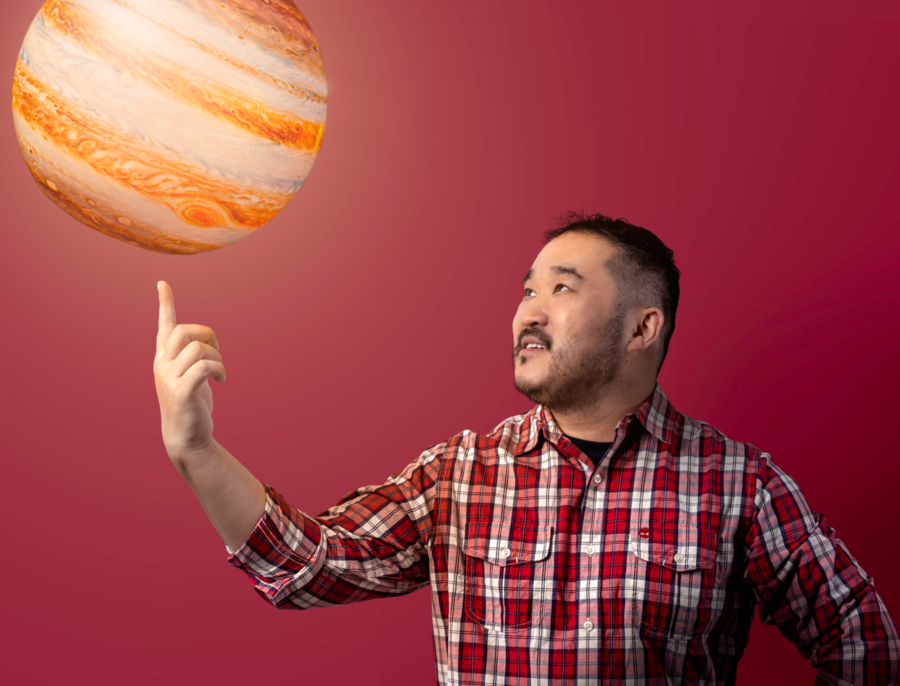
‘The universe is vast, but through computational physics, we can simulate its dynamics, uncover its secrets, and inspire the next generation of explorers.’
 Professor Binzheng ZHANG
Professor Binzheng ZHANGAssociate Professor of the Department of Earth Sciences
- 2022 HKU Outstanding Young Researcher Award
- 2019 NSFC Excellent Young Scientists Fund (Hong Kong and Macau)
Research Interests:
Development of high-performance computing tools for space environment modelling; prediction of space weather impacts on communication and space systems; application of MHD models to planetary environments.
Picture this: a massive, invisible force stretching across the night sky, a third of the heavens occupied by a magnetic field so vast and complex it defies easy comprehension. This is Jupiter’s magnetosphere—a realm of swirling plasma, electrified particles, and enigmatic auroras. For most of us, this might sound like science fiction. For Professor Binzheng Zhang, it is the canvas on which he paints his research.
Zhang is a computational geophysicist and planetary scientist who uses the world’s most powerful supercomputers to simulate and decode the intricate dynamics of planetary environments. His mission is to understand how magnetic fields shape planets and their moons, unlocking secrets that could redefine our understanding of the solar system. His work also has practical implications for space weather prediction, which is critical for safeguarding communication systems and space operations impacted by the dynamic geospace environment.
A Code That Connects the Cosmos
Zhang’s story begins with GAMERA—a powerful programme bridging scientists to the vast worlds beyond Earth. Playing a critical role in its advancement, Zhang uses GAMERA to study planetary magnetospheres like Jupiter’s and to push the boundaries of planetary science and space weather research. ‘We create a virtual space environment inside supercomputers,’ he explains, ‘allowing scientists to explore planetary environments like never before.’
Built on the Lyon-Fedder-Mobarry (LFM) code, GAMERA has evolved into a versatile tool for solving magnetohydrodynamics (MHD) equations across diverse planetary systems. Now adopted by leading institutions like Johns Hopkins University and Caltech, it has transformed space research, from simulating Mercury’s environment to unravelling the mysteries of Venus and Jupiter.
The Jovian Challenge
One of Zhang’s most captivating projects is his work on Jupiter’s magnetosphere, a magnetic field so immense that, if visible, it would dominate the night sky. Simulating such a vast and multi-layered system is a monumental task, requiring cutting-edge algorithms and a deep understanding of plasma physics.
By combining theory, applied mathematics, and advanced computational techniques, his team has created models that offer unprecedented insights into Jupiter’s polar magnetic field. Their findings—published in Science Advances—have even shifted the focus of NASA’s ongoing Juno mission, sparking new research into Jupiter’s magnetic topology and its vibrant polar auroras.
‘When I first developed the supercomputing model for Jupiter’s global magnetic field, I thought I’d made a huge mistake because it looked nothing like Earth’s. I was about to delete it when my collaborators, who are observational experts, stopped me and told me it matched their data perfectly.’
Building on this success, Zhang and his colleagues are expanding their expertise to study the solar system’s most dynamic environments, including the solar corona, inner heliosphere, Venus, Earth, Jupiter, and Saturn. Looking ahead, they aspire to extend their research to Mars, Uranus, Neptune, and perhaps even the hypothetical planet Krypton.
The Road Ahead
Looking to the future, Zhang’s ambitions remain as vast as the planets he studies. He dreams of extending GAMERA to explore Mars’s space environment—a daunting challenge that goes beyond traditional theories of magnetohydrodynamics. He also envisions using his computational tools to predict space weather.
But his ultimate goal is to answer a profound question: Can we simulate the entire solar system using plasma theories? This ambitious vision could revolutionise planetary science and provide critical insights for humanity’s future in space exploration.
While his research pushes the boundaries of human knowledge, Zhang never loses sight of the bigger picture: fostering a sense of curiosity and exploration in others. As a mentor and educator, Zhang is deeply committed to inspiring the next generation of space scientists. Through his research and dedication to innovation, he continues to shape our understanding of the cosmos—and humanity’s place within it.
‘There remain many unknowns, and an entirely new universe awaits discovery. I will continue doing what I enjoy and finding joy in what I do.’
| < Previous | Next > |

